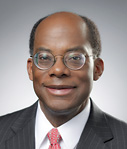When it comes to saving for retirement, most Americans could be focused on the wrong number.
Roger W. Ferguson Jr., president and chief executive officer of TIAA-CREF, which manages the retirement savings of 3.7 million people, suggests that instead of looking at the total wealth accumulated consumers should know how much income they’ll have each month.
Ferguson will address retirement issues as part of the Policy Talks @ the Ford School from 4:30 p.m. to 6 p.m. Thursday at the Annenberg Auditorium.
His remarks will cover the current retirement landscape, how the American retirement system can be repaired and what individuals can do to ensure their own lifelong financial security.

“My goal being on the campus of the University of Michigan with all those smart people is to try to tell folks the truth as we know it,” he said. “I think accuracy and honesty around these tough issues particularly on a university campus is the most important thing one can do.”
The current retirement landscape is in transition as baby boomers turn 65, life expectancy has increased, traditional pensions have phased out, Social Security is under pressure, U.S. savings rates are down and the stock market remains volatile.
“Each leg of the retirement stool is a little wobbly right now,” Ferguson said.
As a result, many workers ages 25 to 35 are so concerned about the stock market that they are avoiding it altogether. Older workers also are uncertain about whether “the stock market is the place to be,” he said.
Ferguson says you have to “tune out the day to day noise” and focus on long-term investing instead of short-term market fluctuations.
“You really do need a broadly diversified portfolio and equities are part of that,” he said.
Here are some ways Ferguson suggests workers can plan better for retirement:
• Save, save, save and then save some more. It is never too early or too late to save. Put away 10 percent of your salary, if you can.
• Consider annuities in your portfolio for diversification and income in retirement.
• Create a long-term strategy.
• Know your appetite for risk and invest accordingly.
When it comes to policy changes, those that make the most sense include automatic enrollment in savings with an escalation mechanism that would increase as earnings rise, he said.
Also, the country needs a stronger emphasis on financial literacy. Roughly half, or 25 or 26 states have some requirement for financial literacy in the K-12, he said. Ferguson advocates for some financial education in K-12 and college to help young people understand the implications of their financial choices.
Without adequate retirement savings, people will have to reduce expenses.
“Social Security and other things will be there,” Ferguson said. “The other thing is, while it’s not easy, if one can continue to work a person should think about that.”
Ferguson is a former vice chairman of the Board of Governors of the U.S. Federal Reserve System and a member of President Obama’s Council on Jobs and Competitiveness.

